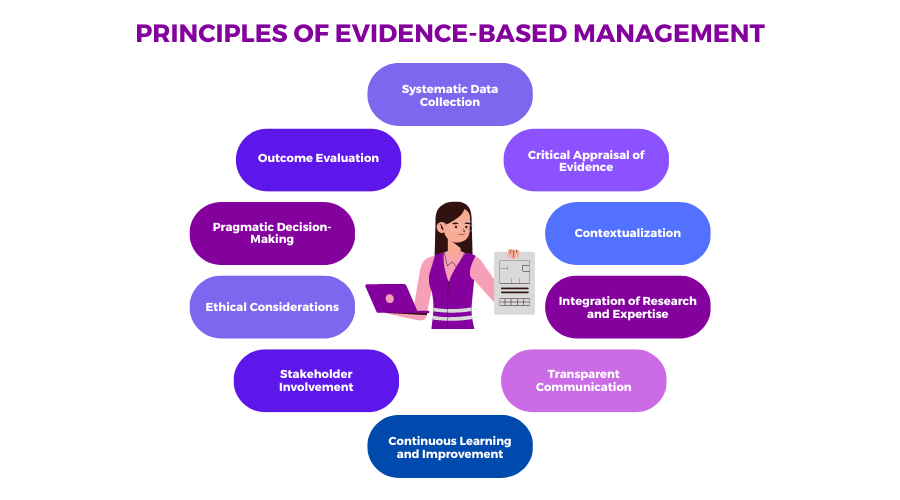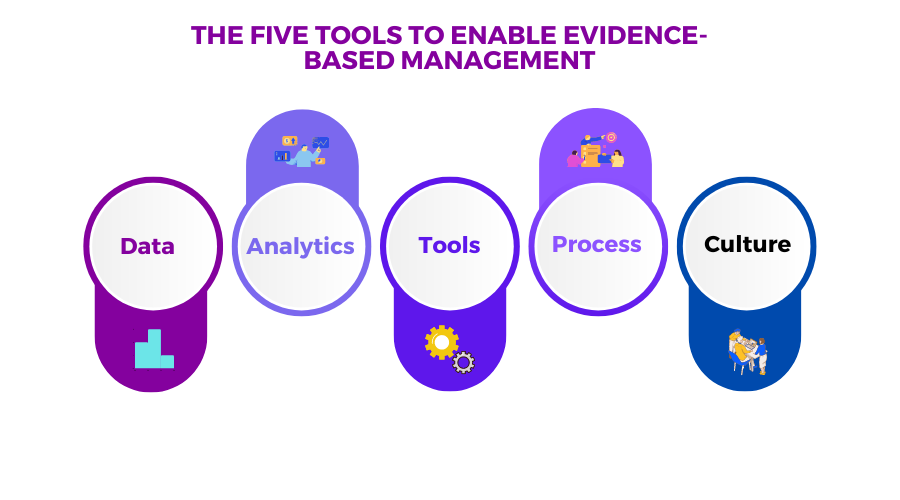Evidence Based Management Definition & Why You Need It?
June 16, 2022 Max 6min read

What Is Evidence-Based Management?
Evidence-based management definition:
Evidence-based management (also known as EBM or EBMgt) is a management technique that involves acquiring knowledge via numerous sources of data and empirical outcomes to make favorable business decisions.
Whether big or small, every company has to make decisions daily. Every decision impacts the business differently.
However, all managers want a favorable outcome from every decision they make. This is where evidence-based management comes in.
The term “evidence-based” came into existence in the 1990s in medicine. But its concepts now stretch across disciplines as diverse as criminology, education, public policy, and management.
According to evidence-based management, one should combine critical reasoning and the best available evidence to make management decisions.
When we say ‘evidence,’ we mean facts, information, or data that supports (or refutes) a claim.
Scientific research can provide evidence, but so can internal company information and even professional expertise.
In essence, all managers make their judgments on ‘evidence.’
David Sackett defines evidence-based management as “making decisions through the conscientious, explicit and judicious use of the best available evidence from multiple sources by asking, acquiring, appraising, aggregating, applying and assessing to increase the likelihood of a favorable outcome.”

Most managers pay very little attention to the quality of the evidence upon which they base their choices. As a result, management decisions frequently depend on so-called “best practices” and the success stories of well-known CEOs.
Evidence-based management tries to solve this issue by assisting managers in carefully evaluating the validity and applicability of the evidence at their disposal and how to locate the best available evidence.
To be an evidence-based manager, you must use the scientific literature to answer problems, inspire strategy decisions, and develop long-term goals.
Published research in psychology, economics, communications, or even sociology can guide evidence-based management decisions.
An evidence-based manager methodically evaluates the body of data, assessing the quality and usefulness of research.
Evidence-based management is a framework that businesses may use to measure, monitor, and grow the value they obtain from their product delivery.
EBM is concerned with improving outcomes, lowering risks, and optimizing investments.
Why Is Evidence-Based Management Important?
Agile leaders realize that frequent result inspection reduces risk and enhances the capacity to provide value.
Their executives base investment decisions on ROI and value. At the same time, they seek to persuade the organization to foster an adaptive culture that allows it to grab breakthroughs before competitors.
Using an iterative and progressive approach, evidence-based management assists businesses in placing the right metrics to invest in the right places, make wiser decisions, and decrease risk.
With agile principles and core agile values, this empirical method enables the organization to take successful steps toward change.
Why Does Every Company Need Evidence-based Management?
There are numerous benefits of taking on evidence-based management. The Scrum organization advocates it.
Let’s explore some of the key reasons why every company needs evidence-based management:
Helps Organizations Set Their Goals in a World of Complex Data
Complex problems resist simple answers, necessitating that companies work toward their goals in small steps.
This involves analyzing the outcomes of each step and changing their subsequent actions depending on the input.
With evidence-based management, organizations undertake experiments to progress toward their strategic objective, which involves creating hypotheses to advance the organization toward its current intermediate goal.
They use the evidence they receive to evaluate their goals and select their next steps to develop toward these goals as they execute these experiments and gather findings.
Reduces Errors in Judgement
An evidence-based management approach decreases the possibility of illogical thinking, bias, or fatigue influencing management decisions.
An evidence-based manager studies the existing literature on the issue and critically assesses the quality of the evidence.
You must then adopt a plan that is supported by science rather than choosing an intervention or strategy based on gut sentiments, personal experiences, or popular industry trends.
Increases Accountability
Making correct or incorrect judgments has a direct impact on organizational success.
You should ensure that your decision-making follows the highest quality standards accessible. This is critical for you as an individual and the company, department, product, or team you are accountable for.
The quality of your decision-making influences their future.
Using an evidence-based management approach ensures that you consider the best available evidence when deciding.
Now that you know about the benefits of evidence-based management, let’s understand how to use it.
How To Use Evidence-Based Management?
You must remember that evidence-based management is an approach rather than a rigid system.
Evidence-based management makes us more responsive and accountable leaders while improving organizational outcomes.
The Chartered Institute of Personnel and Development (CIPD) and the Center for Evidence-Based Management (CEBMa) suggest six measures you can use to increase the likelihood that your decisions will result in a beneficial outcome:
Asking
This involves converting a practical difficulty or problem into a question that you can answer. Here you hypothesize your situation.
Acquiring
This is the systematic search for and retrieval of evidence. Here you use multiple sources to look for evidence. Hang on tight. We’ll go through the four sources of evidence ahead.
Appraising
At this stage, you’ll evaluate the credibility and importance of the evidence. It’s not enough to find data. You must ensure that it is valid and applicable.
Aggregating
Here’s where you weigh and assemble evidence. Sift through your evidence and filter what best suits the situation at hand.
Applying
Here, you’ll be Integrating evidence into the decision-making process. After all, what’s the point of gathering evidence if you’re not going to incorporate it into your decision?
Assessing
Time to evaluate the decision’s outcome. While evidence-based management increases your likelihood of a favorable outcome, you must still assess how your decision has worked out.
This helps in improving your evidence-based management process in the future.
What Are the Four Sources of Evidence-based Management?
Now you know how to use evidence-based management in your decisions. Let’s look at the different sources of evidence.
There are four sources of evidence in evidence-based management. They are as follows:
Scientific Literature
Scientific evidence-based knowledge is more accurate than expert judgments or best practices.
Published peer-reviewed research (typically in management or other academic journals) and primary research from reputable, unbiased industry sources are examples of scientific literature.
Internal Data
Professional judgments based on actual data are significantly more accurate than human experience-based judgments.
You may use data such as product analytics, KPIs, and other business metrics.
Product management tools and product management software comes in handy while tracking your product metrics.
Professional Expertise
Many people’s professional experience leads to more accurate conclusions than a few people’s personal experiences.
Connecting with industry representatives and networking can help us gain more well-rounded viewpoints on our judgments.
Stakeholders
A stakeholder is a person or group of persons who hold shares in a company or a product. They can impact the value of the product.
Focus groups, internal polls, or—more efficiently—enterprise discussion management software can be used to consult those whom your decisions affect.
A customer advisory board is another way to get your major stakeholder- your customer’s opinion on product-related decisions.
Learn more about stakeholder management here!
Chisel is one of the best product manager tools that include features such as Team Radar to help you keep track of your teams opinion.
Evidence-based management approaches have the potential to improve how we think and act.

We can execute our jobs more effectively and develop healthier companies by applying better, a more profound logic and facts from various sources and addressing gaps with product management tools like Chisel.
Check out our blog for more insightful pieces on product management.
FAQs
Some of the most famous examples of evidence-based management are performance management systems, employee recognition, hiring techniques, user-experience designs, and Agile development methodologies.
The value of evidence-based management lies in its ability to reduce risk and enhance the capacity to provide value through iterative steps.
The four key value areas in EBM are Current Value (CV), Unrealised Value (UV), Ability to Innovate (A2I), and Time-to-Market (T2M).
